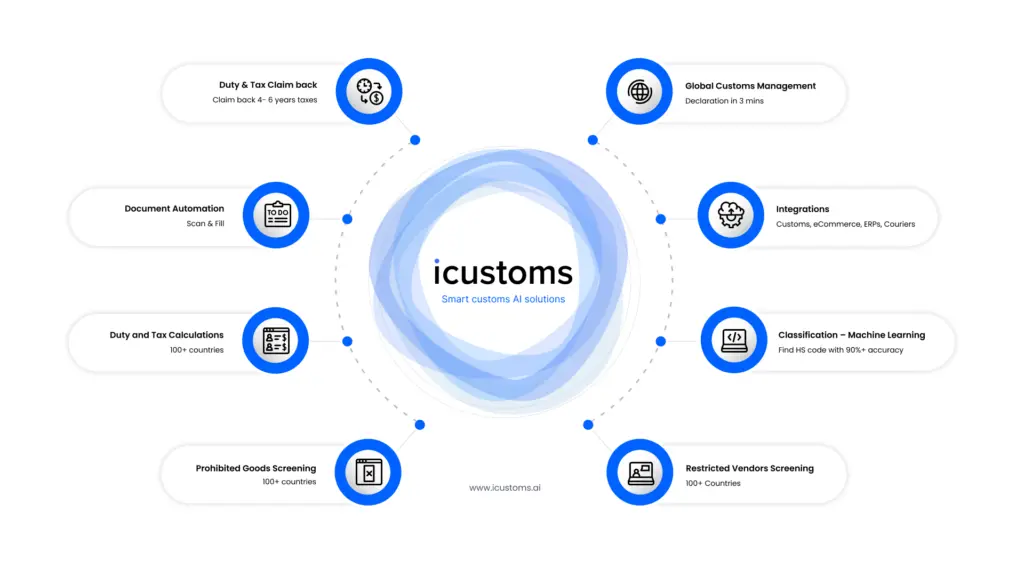Fast & Accurate ENS GB & EU ICS2 Solutions Built for You.
iCustoms Role in UK Single Trade Window | Opportunity for Businesses
-
Freya Jane
- Director of Customer's Success
The UK government has been working to make business easier across borders and make trade processes more efficient.
One of these projects is the Single Trade Window (STW), a digital platform that makes it easier for businesses that trade internationally to do business.
This article will discuss the policy discussion paper on the UK Single Trade Window that was just released.
Background
The UK Single Trade Window is part of the government’s wider agenda to enhance trade and commerce in the country. The STW aims to provide a single digital platform for all import and export related transactions, making it easier and quicker for businesses to trade across borders.
The platform will be available to all businesses, regardless of size or industry, and integrated with other government systems such as customs and tax.
Policy Discussion Paper
The recently published UK Single Trade Window Policy Discussion Paper outlines the government’s vision for the STW and its plans to make it a reality.
The paper says that the STW will make businesses’ lives much easier and make the UK more competitive internationally.
The paper identifies key areas that the government will focus on to make the STW a success, such as:
Simplifying Processes:
The STW will simplify and streamline trade processes by eliminating duplication and reducing the need for paper-based processes. This will result in significant time and cost savings for businesses.
Better Transparency: The STW will give businesses more visibility and clarity throughout the trade process, from before the goods arrive to after they have been cleared. This will enable businesses to track their shipments and quickly resolve any issues.
Integration: The STW will be integrated with other government systems, such as HMRC, DEFRA, and Home Office, to provide a seamless trade experience for businesses.
Collaboration: The government will work closely with businesses like iCustoms and stakeholders to ensure that the STW is designed to meet their needs and address any concerns.
Challenges
Technical Complexity: Creating and putting the UK Single Trade Window (STW) into place will require a lot of technical know-how and investments in technology and infrastructure. There may be challenges in ensuring interoperability with existing systems and standards.
Regulatory Compliance: It will require compliance with various regulatory frameworks and standards, including those of the European Union and World Trade Organization. Failure to comply with these standards could result in trade disruptions and legal challenges.
Data Security and Privacy: The STW will handle a large volume of sensitive data, including trade documentation and personal information. There are concerns about data security and privacy and ensuring compliance with relevant laws and regulations.
Adoption and Integration: The success of the STW will depend on its adoption and integration with other government systems, such as customs and tax systems. Ensuring smooth integration could be a challenge.
Opportunities
Enhanced Efficiency: The STW has the potential to significantly enhance trade efficiency and reduce costs for businesses. It will streamline trade processes, reduce duplication, and provide real-time tracking of shipments.
Improved Transparency: It will make the whole trade process more clear, so businesses can solve problems quickly and make fewer mistakes.
Increased Competitiveness: The STW will make the UK more competitive on the world market by lowering trade barriers and making it easier for goods to move from one place to another.
Better trade relationships: The STW will require businesses, governments, and other stakeholders to work together and cooperate. This provides an opportunity for improved trade relationships and dialogue.
Economic Development: The STW could help the economy grow by making trade easier, increasing the amount of trade, and creating new jobs.
Role of innovative technology
Technology plays a crucial role in the success of the UK Single Trade Window policy. Here are a few ways in which technology can help:
Interoperability: Developing a single trade window requires the integration of various systems and technologies used by different stakeholders. Interoperability is essential to ensure smooth functioning of the STW.
Technologies like APIs (Application Programming Interfaces) can facilitate seamless data exchange between systems, improving interoperability.
Artificial Intelligence (AI) and Machine Learning (ML): AI and ML can be used to automate trade processes, such as document verification and risk assessment. This can help reduce the workload of customs officials, improve accuracy, and speed up the trade process.
Data Analysis: The STW creates a lot of data that can be used to improve the way trade works and make policy decisions. Data analytics can look at trade data and find patterns and trends that can help shape trade policies and strategies.
Overall, technology can greatly impact how the UK Single Trade Window policy is made and used. Using new technologies, the STW can improve trade efficiency, security, and transparency while lowering costs and making businesses more competitive.
How iCustoms can help?

Automated Calculation of Duties and Taxes: iCustoms.ai can automatically figure out duties and taxes based on the value of the goods and the tariff codes that go with them. This cuts down on mistakes and speeds up customs clearance.
Integration with the UK Single Trade Window: iCustoms will integrate with the UK Single Trade Window, enabling the exchange of customs data between businesses and customs authorities, streamlining trade processes and reducing duplication.
iCustoms will help businesses and governments streamline trade processes, cut costs, and improve efficiency. Its integration with the UK Single Trade Window policy can increase trade transparency, improve compliance, and track shipments in real-time, making trade more efficient and competitive.
Conclusion
The UK Single Trade Window is an important project that will make trade and business in the UK much more efficient and competitive. The policy discussion paper released is a good step toward making the STW a reality.
The government’s commitment to simplifying trade processes, enhancing transparency, and collaborating with businesses and stakeholders is crucial to the success of the STW. The UK Single Trade Window will be an important tool for businesses dealing with trade challenges after Brexit.
You may also like:
Empower Your Customs Agency with
Smart Declaration Software
Enhance Efficiency, Reduce Errors, & Simplify Customs Management
Subscribe to our Newsletter
About iCustoms
Empower Your Customs Agency with
Smart Declaration Software
Enhance Efficiency, Reduce Errors, & Simplify Customs Management
